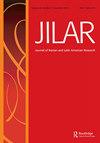阿根廷与澳大利亚比较(19世纪80年代至60年代):国家财政与教育和卫生投资
IF 0.3
0 HUMANITIES, MULTIDISCIPLINARY
Journal of Iberian and Latin American Research
Pub Date : 2021-01-02
DOI:10.1080/13260219.2021.1947352
引用次数: 0
摘要
摘要自19世纪末以来,阿根廷和澳大利亚的比较一直很常见,因为两国在商品出口和移民进口、金融和技术方面都有相似的经济。到了20世纪70年代,很明显,总体而言,澳大利亚人的生活水平高于阿根廷人。在这篇文章中,我们认为,至少在一定程度上,这是因为澳大利亚有一个更具干预主义的国家,它比阿根廷国家增加了更多的人均收入,并在包括教育和卫生领域在内的社会资本发展方面投入了更大、更有效的资金。这一发现支持了世界银行等多边组织最近的论点,即对人力资本的投资,特别是对教育和卫生的投资,可以促进经济和社会发展,而这种投资是以政府干预为前提的。本文章由计算机程序翻译,如有差异,请以英文原文为准。
Comparing Argentina and Australia (1880s-1960s): State Finances and Investments in Education and Health
ABSTRACT Since the late nineteenth century, comparisons of Argentina and Australia have been common as both countries had and have similar economies based on the export of commodities and the importation of migrants, finance and technology. By the 1970s it was apparent that in general Australians had a higher standard of living than did Argentines. In this article we argue that at least in part this was due to there being a more interventionist State in Australia, which raised more revenues per capita than did the Argentine State, and invested more heavily and more effectively in the development of societal capital including in the areas of education and health. This finding supports recent arguments from such multilateral organizations as the World Bank that investment in human capital, especially education but also health, generates economic and social development, and that this investment is predicated on government intervention.
求助全文
通过发布文献求助,成功后即可免费获取论文全文。
去求助
来源期刊

Journal of Iberian and Latin American Research
HUMANITIES, MULTIDISCIPLINARY-
CiteScore
0.60
自引率
0.00%
发文量
22
 求助内容:
求助内容: 应助结果提醒方式:
应助结果提醒方式:


